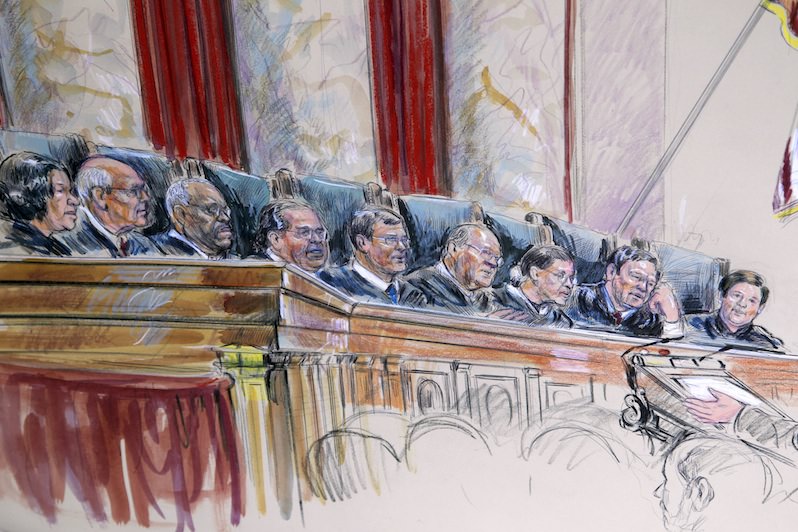The Supreme Court Approaches Judgment Day
With a bench containing three octogenarians, the next president will have a historic opportunity to reshape the court. At stake: five pivotal legal and social issues. The Supreme Court justices during a 2010 hearing. From left: Sonia Sotomayor, Stephen Breyer, Clarence Thomas, Antonin Scalia, Chief Justice John Roberts, Anthony Kennedy, Ruth Bader Ginsburg, Samuel Alito and Elena Kagan. (Dana Verkouteren / AP)
The Supreme Court justices during a 2010 hearing. From left: Sonia Sotomayor, Stephen Breyer, Clarence Thomas, Antonin Scalia, Chief Justice John Roberts, Anthony Kennedy, Ruth Bader Ginsburg, Samuel Alito and Elena Kagan. (Dana Verkouteren / AP)
I know you’ve heard this before, but this time the future of the Supreme Court really is up for grabs in the coming presidential election. By the time November rolls around, three of the justices—Ruth Bader Ginsburg, Antonin Scalia and Anthony Kennedy—will be octogenarians. Right behind them, Justice Stephen Breyer will be 78.
Unless Father Time goes on permanent leave or the laws of nature are suspended, all four could resign on short notice, allowing the next occupant of the White House to appoint their successors.
Since the average tenure of justices appointed since 1970 has exceeded 26 years, the next president will have the opportunity to reshape the nation’s most powerful judicial body for a generation or more. And with the power to reshape the court will come the power to redefine the meaning and application of the Constitution.
It’s not only liberals and progressives like me or folks at watchdog groups like People For the American Way who are fretting about the direction of the court. If anything, conservatives are even more on edge.
At the Federalist Society’s annual lawyers convention late last year, according to the Washington Times, seasoned Supreme Court litigator Michael Carvin voiced the angst shared by many on the right in the most dramatic terms, declaring: “If the election goes wrong … we will all descend into a hellish existence from which we will never emerge.”
Carvin’s anxiety was echoed by professor Michael Paulsen, a constitutional scholar from the University of St. Thomas School of Law. “Ideology matters,” Paulsen told the crowd gathered at the Mayflower Hotel in Washington, D.C. “Judicial philosophy matters. Sometimes it’s literally a matter of life and death who[m] you appoint to the court.”
It’s easy to understand such concerns. The replacement of even a single justice could swing the tribunal’s voting balance on a variety of pivotal legal issues, prompting reconsideration of a host of recent, landmark 5-4 decisions. Since those decisions are a mixed bag, some liberal in outlook and effect and others conservative, both ends of the political spectrum have plenty of skin in the game of remaking the court.
Among the issues and cases most likely to be re-evaluated by a new panel of justices are these five headliners:
Citizens United v. FEC, and Campaign Finance
Of the plethora of pro-business rulings handed down since Chief Justice John Roberts assumed office in 2005, none has done more to consolidate the oligarchy’s hold on government than the Citizens United decision of January 2010.
In his majority opinion, Justice Kennedy invoked the First Amendment and the legal fiction of corporate personhood to sweep away decades of legislative and judicial precedent that had prohibited corporations and unions from spending their general treasury funds on federal elections. Two months later, invoking the reasoning of Citizens United in the case of SpeechNow.org v. FEC, the U.S. Court of Appeals for the District of Columbia Circuit approved the formation of super PACs, the so-called “expenditure-only” entities that cannot give money directly to candidates but can independently raise and spend unlimited sums on their behalf.
In 2014, in McCutcheon v. FEC, the Supreme Court struck again by a 5-4 margin, this time in an opinion penned by Roberts, lifting the long-established aggregate limits on the amount of money that wealthy individuals can donate directly to candidates in any given election cycle.
Both Hillary Clinton and Bernie Sanders have vowed that, if elected, they will place justices on the court committed to reversing Citizens United, McCutcheon and presumably earlier rulings such as Buckley v. Valeo, decided in 1976, to limit the role of money in politics. Their opponents have promised to do exactly the opposite.
Heller v. District of Columbia, and the Second Amendment
Prior to Scalia’s 5-4 paean to gun rights in 2008’s Heller decision, the dominant view expressed both by academics and judges in the few court cases that addressed the issue was that the Second Amendment protected individual gun ownership only in connection with service in antiquated state militias. All that changed, however, with the triumph of Scalia’s “originalist” interpretation of the amendment, which asserts that the Founding Fathers intended to secure constitutional protections for the personal right to bear arms.
And while the Heller decision was limited to gun ownership in the nation’s capital and other federal venues, the court extended its analysis to the states two years later in McDonald v. Chicago.
Despite being widely panned by Second Amendment experts such as Fordham University’s Saul Cornell as a “constitutional scam” based on a sloppy reading of colonial history, Scalia’s originalism is now the law of the land, venerated as holy writ by every Republican presidential hopeful.
By contrast, Clinton—and to a lesser extent Sanders—supports such gun control measures as mandatory background checks, assault weapons bans, trigger-lock laws and prohibitions on cross-state, concealed-carry permits.
Sooner or later, the Supreme Court will take up another major firearms case. When it does, depending on who wields the gavel, Heller and McDonald could well be overturned—or be further entrenched in the bedrock of our constitutional law.
National Federation of Independent Businesses v. Sebelius, and Obamacare
In what many conservatives regard as a great betrayal, Chief Justice Roberts authored the bitterly divided, 5-4 opinion that upheld the Affordable Care Act’s individual mandate in 2012. What’s largely been forgotten is that Roberts’ opinion was anything but an enthusiastic endorsement of the ACA. The mandate survived, but barely—and not as an exercise of the federal government’s constitutional power to regulate interstate commerce, as the Obama administration had urged, but as a function of Congress’ authority to levy taxes.
Since then, the ACA has been repeatedly attacked, politically and legally. Last term, in a 6-3 decision (King v. Burwell), again written by Roberts, the court turned away a highly technical suit argued by Michael Carvin that sought to invalidate federal income tax subsidies for low-income purchasers of health insurance in states that have not set up their own marketplace exchanges.
The King decision sent Scalia into a tizzy, prompting him to lambaste the majority’s holding as “interpretive jiggery-pokery” for its allegedly shoddy reasoning and as “pure applesauce” for what he argued was an undeserved windfall it bestowed on ACA beneficiaries. The case also sparked widespread calls on the right for Roberts’ impeachment.
This term, the ACA faces another Supreme Court test, akin to 2014’s Hobby Lobby litigation, in Little Sisters of the Poor Home for the Aged v. Burwell and five related appeals that once more challenge the statute’s contraceptive services mandate. The plaintiffs are nonprofit religious organizations that, like Hobby Lobby Stores Inc., argue that the ACA’s birth-control insurance provisions violate their rights as employers under the Religious Freedom Restoration Act of 1993.
Given the Hobby Lobby precedent, it’s easy to see the current court handing a narrow, 5-4 victory to the Little Sisters. But if we remove Ginsburg from the equation in future ACA lawsuits and replace her with a clone of Thomas or Justice Samuel Alito, the entire structure of Obamacare conceivably could crumble.
Obergefell v. Hodges, and Same-Sex Marriage
If Scalia was sent into orbit by the King case, he positively lost his jurisprudential bearings when Kennedy teamed up with the panel’s four liberals to write the majority opinion in Obergefell v. Hodges, recognizing a constitutional right to same-sex marriage.
Raging in dissent, Scalia branded Kennedy’s opinion “a naked judicial claim to legislative—indeed, super-legislative—power.” Lamenting the end of federalism and states’ rights, he charged that a “system of government that makes the People subordinate to a committee of nine unelected lawyers does not deserve to be called a democracy.”
As if yielding to paranoid fantasy, he continued: “Who ever thought that intimacy and spirituality (whatever that means) were freedoms? And if intimacy is, one would think Freedom of Intimacy is abridged rather than expanded by marriage. Ask the nearest hippie.” Not quite finished, he added in a boorish footnote: “The Supreme Court of the United States has descended from the disciplined legal reasoning of John Marshall and Joseph Story to the mystical aphorisms of a fortune cookie.”
It boggles the mind to think that if Kennedy, Breyer and/or Ginsburg leave the bench before Scalia and are replaced by hard-line conservatives, Scalia’s homophobia could command a new majority and wind up toppling marriage equality.
Obergefell represents the greatest formal advance for constitutional and human rights achieved in this country in decades. It literally hangs in the balance.
The Death Penalty
Although the court has nibbled away at the periphery of capital punishment in recent years, holding it unconstitutional as applied to juveniles and the mentally ill and overturning Florida’s capital sentencing procedures (Hurst v. Florida), it has consistently declined to abolish the death penalty outright.
The rest of the civilized world, however, is turning away from capital punishment, and only six American states conducted executions in 2015. Last term, in Glossip v. Gross, the court passed on yet another opportunity to join the enlightenment.
As I have previously written in this column, Richard Glossip was convicted of a 1997 murder in Oklahoma but may very well be innocent. Technically, the issue before the court in his case was not whether he had committed the homicide, but whether the state’s use of a new and highly controversial three-drug cocktail in its lethal injection protocol violated the Eighth Amendment’s prohibition of cruel and unusual punishment.
Alito’s majority opinion, joined by the court’s other Republican appointees, answered the issue with a ringing endorsement of the protocol, despite the fact that the cocktail had caused prolonged agony in two executions.
While Alito’s decision came as no surprise, Breyer’s dissent broke serious new ground. Writing for himself and Ginsburg, Breyer declared not only that he would have granted Glossip’s petition (which had been filed both for him and several other Oklahoma prisoners facing imminent execution), but that he would have taken another, far bolder step—calling for a re-examination of the death penalty itself. “[R]ather than try to patch up the death penalty’s legal wounds one at a time,” Breyer reasoned, “I would ask for full briefing on a more basic question: whether the death penalty violates the Constitution.”
Breyer’s opinion marked the first time since the late Justice Harry Blackmun’s dissent, in a case from Texas, that a sitting member of the court has formally taken an abolitionist stance on the death penalty.
As Breyer’s dissent illustrates, the future of capital punishment, like the overall direction of the court, is in play. In the meantime, Glossip remains under a sentence of death, although his execution has been stayed pending a review of the Oklahoma protocol by the state’s attorney general.
The five cases I’ve singled out comprise only a sliver of the hot-button issues that may come before a reconstituted Supreme Court dominated by justices appointed by President Obama’s successor. No doubt other critical cases also will arrive before the new court, raising questions that touch the most sensitive and intimate aspects of our daily lives—from abortion rights to police brutality, from global warming and immigration to voting rights and government surveillance.
Few of us may be satisfied with the ultimate nominees of the two main parties, and you can count me among the likely disgruntled if anyone but an aging, slightly stoop-shouldered senator from Vermont captures the Democratic nod. But none of us can plausibly argue that the election won’t matter, especially when it comes to the future of the Supreme Court and the laws it oversees.
Your support matters…Independent journalism is under threat and overshadowed by heavily funded mainstream media.
You can help level the playing field. Become a member.
Your tax-deductible contribution keeps us digging beneath the headlines to give you thought-provoking, investigative reporting and analysis that unearths what's really happening- without compromise.
Give today to support our courageous, independent journalists.








You need to be a supporter to comment.
There are currently no responses to this article.
Be the first to respond.